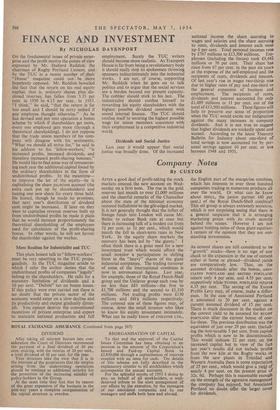Company Notes
By CUSTOS AMR a good deal of profit-taking the stock markets entered the new account on Wed- nesday on a firm note. The rise in the gold reserves last month to over £1,000 millions and the cheerful remarks of the Chancellor about the state of the national economy restored bullishness to the gilt-edged market. It is not generally thought that the influx of foreign funds into London will cause Mr. Butler to reduce Bank rate at once but there is increasing talk of a modest cut from 31 per cent. to 31 per cent., which would match the fall in short-term rates in New York. In the equity share markets the recovery has been led by "the. giants." I often think there is a great need for a new investment trust which would afford the small investor a participation in shilling form in the "heavy" shares of the giant industrial companies. The trading turnover of some of the international combines is now in astronomical figures. Last year, for example, those of the Royal Dutch-Shell group and'the Unilever group each rose by no less than £83 millions—the first to £1,700 millions and the second to £1,310 millions. Net trading profits were £130 millions and £611 millions respectively. The colossal size of these figures may, of course, deter the small investor who likes to know his equity investment intimately. What can he really know of UNILEVER LTD., the English part of the margarine combine, which has interests in over three hundred companies trading in numerous products all over the world. Or what can he know about SHELL, the junior partner (40 per cent.) of the Royal Dutch-Shell combine? This oil group is always extremely secretive, which is not surprising seeing that there is a general suspicion that it is arranging marketing prices with its rivals secretly behind the scenes. However I am not against holding mites of these giant equities: I remain of the opinion that they are out- standing investments.
• As cement shares are still considered to be "growth" stocks—there is no sign of any check to the expansion in the use of cement either at home or abroad—dividend yields are comparatively low. Thus, on the assumed dividends after the bonus, ASSO- CIATED PORTLAND and BRITISH PORTLAND return only 4 per cent. and 4.55 per cent. respectively while TUNNEL PORTLAND returns 4.35 per cent. The saving of the Excess Profits Levy may, of course, make a differ- ence. In the case of Associated Portland it amounted to 20 per cent. against a current assumed dividend of 15 per cent. There is much discussion in the market on the correct yield to be assumed for RUGBY PORTLAND after the current bonus of one- for-three. The previous distribution was the equivalent of just over 29 per cent. (includ- ing the non-taxable 5 per cent. from capital profits which is now to be discontinued). This would indicate 22 per cent. on the increased capital but in view of the fact last year's results did not include profits from the new kiln at the Rugby works or from the new plants in Trinidad and Western Australia there is some expectation of 25 per cent., which would give a yield of. nearly 4 per cent. on the present price 01 32s. 6d. Perhaps this is reasonable enough on the strength of the agressive management the company has enjoyed, but Associated Portland no doubt offer the larger cover for dividends.










































 Previous page
Previous page